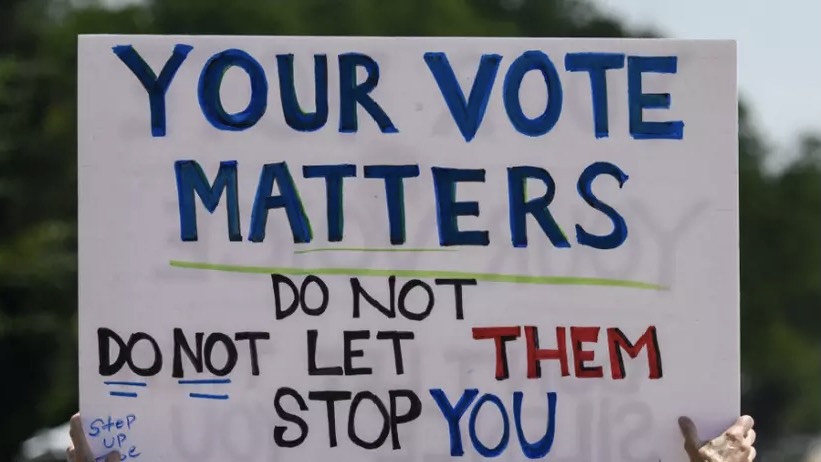As the right-wing Republican Party has pushed legislation in different states to curb access to voting in the United States, thousands across the country came to the streets to defend it. On August 28, Saturday, massive protests and demonstrations were held in the US capital, Washington DC, and several major cities across the country demanding federal legislation to protect voting rights.
According to an estimate by one of the organizers, around 20,000 people participated in a rally in Washington DC, while large crowds gathered in cities like Atlanta, Phoenix, Houston and Miami, among other places. The nationwide demonstration was organized on the 58th anniversary of the historic March on Washington for Jobs and Freedom, when Martin Luther King Jr. delivered his famous “I have a dream” speech addressing a massive crowd of around 300,000 people.
Saturday’s rally and protest march was called “Make Good Trouble Rally” honoring the late congressman and civil rights activist John Lewis. The organizers of the protest demanded that the US Congress pass a federal legislation to protect voting rights and curb the onslaught of recent state laws passed by Republican-held states to curb voting access.
The march in Washington was led by Martin Luther King III, eldest son of Martin Luther King Jr., and was organized by Drum Major Institute, March On, Service Employees International Union (SEIU), and the National Action Network. More than 200 civil society groups and trade unions endorsed or participated in the nationwide protest both locally and nationally, including groups like the American Federation of Labor and Congress of Industrial Organizations (AFL-CIO), American Civil Liberties Union (ACLU), Black Lives Matter, and the Poor People’s Campaign, among others.
The march was announced last month, after Republican senators blocked the For The People Act, which would introduce sweeping reforms including curbs on gerrymandering, new ethics rules for federal officeholders, reform campaign finance laws, and expand access to the ballot for all.
Protesters were seen holding placards and banners that read “Black Lives Matter”, noting the racial disparities in ballot access that the recent state laws will facilitate. “These laws suppress voting methods that enrich our democracy and lead to high turnout,” the campaign organizers stated. “Racist, anti-democratic voter suppression laws amount to rigging the game. But in America, elections are not a game—and lives depend on their outcomes.”
On the eve of the march, on Friday, August 27, the Texas House of Representatives, passed a highly contentious bill that led to a months-long deadlock between the ruling Republicans and the opposition Democrats. Once passed as law, the bill will remove ballot drop boxes and drive-thru voting, while limiting early voting and weekend voting provisions.
Organizers of the protest have also demanded that federal lawmakers pass the John Lewis Voting Rights Advancement Act, named after the late congressman and civil rights leader. The bill, initially proposed as part of the For The People Act, seeks to reinforce the historic Voting Rights Act of 1965, and was passed by the US House of Representatives along partisan lines. Republicans have threatened to block the bill in the Senate through filibuster, where the Democrats do not have enough votes to bypass an opposition filibuster.
As of Saturday, 18 states have enacted a total of 30 state legislations that will limit early voting period and access to ballot boxes and drop boxes, reversing significant advancements made in ballot access and are expected to affect working class voters and racial minorities. As the United States gears up for mid-term general elections next year, these laws will impact not only voter turnouts, but can also affect results.
A group of protesters in Washington DC were also seen congregating to demand for statehood to the capital territory, which does not send any voting representatives to the US Congress. Speaking at this demonstration, Rev. Dr. William J. Barber II, leader of the Poor People’s Campaign, reiterated the campaign’s long-standing demand to pass the two bills but also to raise the federal minimum wages to USD 15 per hour and for DC statehood.
Addressing the crowd, Rev. Barber countered charges that the demands were “radical”, pointing out that it was radical “when we wanted freedom for South Africa… People protested every day in DC for two years. You can’t get this stuff with one rally on anniversary day.” Reminding the protesters about the need for continuous mobilizations, Rev Barber also reminded of the months of long and hard work in organizing for civil rights before and after the 1963 March on Washington, by activists and mobilizers working in Montgomery, Alabama.





